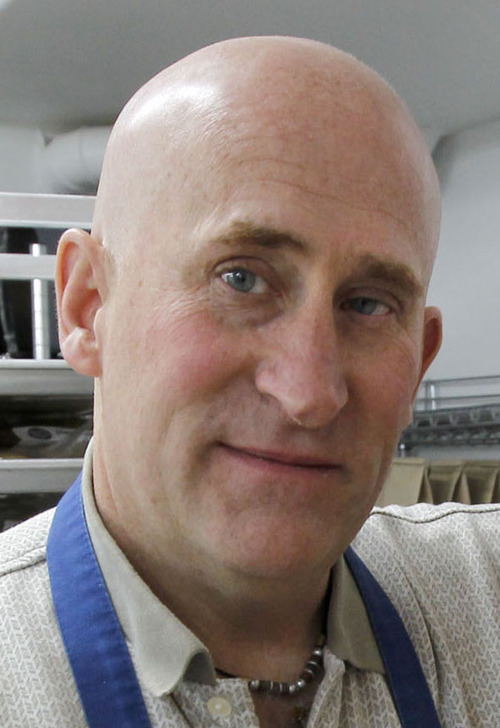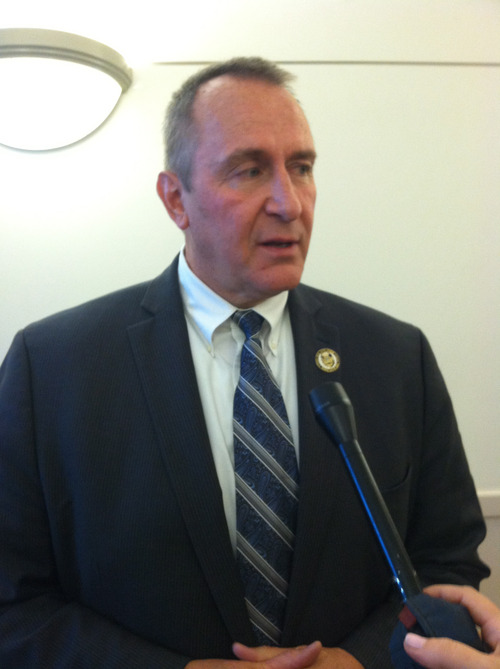This is an archived article that was published on sltrib.com in 2013, and information in the article may be outdated. It is provided only for personal research purposes and may not be reprinted.
A unique plea deal offered to businessman Marc Sessions Jenson came directly from then-Utah Attorney General Mark Shurtleff, who took a particular interest in the case for more than a year — despite resistance from the head of his criminal division, recently released records show.
Hundreds of pages of emails also chart the tortuous path of the Jenson prosecution, complete with claims of attempted bribes, an FBI sting and behind-the-scenes grousing about a plea deal, which a judge tossed as too lenient.
Jenson, who is now doing time for securities violations, has accused Shurtleff and his handpicked successor, former Attorney General John Swallow, of extorting gifts and perks from him while the businessman was free as a result of a later plea deal cut with the Utah attorney general's office.
Receipts show Shurtleff and Swallow stayed at Jenson's posh Southern California villa and played golf, took shopping trips and got massages on the businessman's dime. Jenson said he couldn't say no for fear they would revoke the deal.
The emails verify at least part of Jenson's story — that his plea negotiations were handled with Shurtleff's direct involvement.
The then-attorney general's entanglements in the case had become so deep that the office took the unusual step in June 2011 of walling off Shurtleff and Swallow from any involvement or access to information about the Jenson matter.
Earlier this year, the attorney general's office, with Swallow then at the helm, recused itself from the case, turning it over to the Utah County attorney's office to avoid any perceived conflicts of interest. By this time, Jenson had become a main accuser in the scandal that prompted Swallow to step down as attorney general last week.
The emails, obtained through an open-records request, represent a portion of the thousands of pages that the attorney general's office produced in response to a federal grand jury subpoena issued in July. Initially, the office refused The Salt Lake Tribune's request, but the State Records Committee ordered the release.
Shurtleff's attorney, Max Wheeler, said federal investigators had all of the information and that his client was interviewed by them. Federal prosecutors decided in September not to pursue charges against Shurtleff or Swallow — though two county prosecutors are still investigating the duo.
"We are not going to comment publicly or try this matter in the press until everything is resolved," Wheeler said. "If questions remain, Mark will address those with the appropriate authorities as he has consistently done in the past."
—
Wheels and deals • The Jenson saga dates to 2000 and 2001, when he and a friend, Mark Robbins, rounded up millions of dollars from investors with the goal of buying the Mongoose bicycle company and making bridge loans. But when the bike deal fell through and investors didn't receive their promised return, they demanded action.
From the start, Shurtleff was intimately involved in the Jenson case. A previously released email from a state investigator to Jenson's then-attorney said Shurtleff launched the probe.
In 2005, the Utah attorney general's office charged Jenson with selling unregistered securities and securities fraud.
The case moved slowly, and Shurtleff became the focus of intense lobbying by Jenson allies, including a threat to publicly portray the investigation as a personal vendetta because Jenson had once dated Shurtleff's wife, complete with a mocked-up Tribune headline stating "Jealous A.G. Prosecutes Wife's Old Boyfriend."
These aggressive efforts appeared to grate on Shurtleff, who pushed for a probe of possible witness tampering. In a May 31, 2007, email, he asked his prosecutors, "When is Jensen [sic] set for trial? Can't be too soon as far as I'm concerned. I'm up to HERE with this guy and his goons!"
By December of that year, Shurtleff had cooled on the case.
"I am intent on accepting a no-contest plea in abeyance to three third-degree felonies," Shurtleff wrote to Scott Reed, head of the office's criminal division. "I'm sure this email will be viewed as a capitulation on my part. ... Please know I am not succumbing to bribes or threats."
Rather, Shurtleff wrote, it was based on concerns about the believability of witnesses, "my own conversations with Jensen [sic] and my conclusion that he will be very believable to a jury."
The boss's directive displeased Reed.
"I have to respectfully disagree with this approach," Reed wrote, "and suggest that this case could be a benchmark for the future in terms of how defendants and their attorney negotiate with this office."
Reed said he understood Shurtleff's "open door" policy of being willing to meet with anyone, "but in this case, [it] has become a runaway freight train as a result, and I think we can expect more of the same in the future if we as an office don't resist these tactics."
But Shurtleff's plea plan went ahead and other parties became involved, including Rob Stahura, a major campaign fundraiser for the attorney general, and Tim Lawson, a Shurtleff friend often described as his "fixer," whose intervention in cases and exploitation of his ties to the attorney general prompted top deputies to launch a criminal probe of Lawson.
The emails show that Lawson, who is not an attorney, gained direct access to details of the plea negotiations. In February 2008, Lawson emailed Shurtleff with the latest plea proposal.
"All I would like you to do, bro, is review this," Lawson wrote to Shurtleff, who forwarded it to Reed and Kirk Torgensen, a chief deputy attorney general.
"Why are we dealing with this guy [Lawson]?" Torgensen wrote back. "We cannot ethically deal with this guy outside of Jenson's counsel. This is inappropriate for Lawson to be doing this."
Shurtleff continued to email Reed about the status of the plea negotiations. Eventually, Reed urged him to back off.
"Look, boss, the deal is almost done," Reed wrote in a March 19, 2008, email. "I would prefer you stay out of it at this point."
Lawson and Jenson's attorneys pushed for a deal in which Jenson would plead guilty to reduced charges, serve no jail time and face no restitution. Reed, in an April 2008 email to Torgensen, expressed his frustration with the direction of the plea negotiations.
"People are asking me, 'Why are you doing this?' " Reed wrote. "And I have a hard time coming up with an answer without telling the truth or telling a lie."
Weeks later, Reed stood in front of 3rd District Judge Robin Reese, trying to justify the deal — which was almost exactly as Shurtleff had proposed six months earlier — in the face of opposition from victims demanding restitution.
Reese rejected the deal, deeming it too lenient, setting off a scramble to salvage a plea. Jenson has said Swallow and Lawson took part in those negotiations.
On May 29, 2008, Reese accepted a new deal, which required Jenson to pay $4.1 million in restitution over three years. If he did that and didn't break any other laws, the offense would be wiped away.
—
California, here they come • Jenson relocated to California, moving into a villa in Pelican Hill, a lavish resort near Newport Beach whose guests included the likes of comedian Chris Rock, baseball slugger Alex Rodriguez and boxing legend Sugar Ray Leonard.
When the resort's owner learned of Jenson's legal issues, he asked the general manager, Paul Ruffino, to check him out. One of the references Ruffino said Jenson gave him was Shurtleff.
"Mark Shurtleff went out of his way to reassure me," Ruffino said in an interview. "[Shurtleff said], 'When I was first involved with Marc, I thought he was a pretty bad guy and the more investigating, the more I talked to people and did things, not only do I think Marc is not a bad guy, I think he's a pretty good guy.' And a lot of the things that were done to Marc prosecution-wise in Utah were because people in his office believed people they should not believe, and he was going to do everything in his power to clear his name."
A short time later, on May 5, 2009, Shurtleff and Swallow stayed in Jenson's guest villa. Receipts show they played golf and Swallow charged several purchases to Jenson's account.
Later that month, Shurtleff asked his prosecutors to look at another Jenson case — one in which Jenson claimed a partner had swindled the businessman out of his interest in Mount Holly, a $3.5 billion ski and golf resort development planned near Beaver in southern Utah.
In a Sept. 23, 2009, email, Reed asked Torgensen if Shurtleff had been in California around Cinco de Mayo.
"This coincides with Mark's directive to put a bunch of Mounty [sic] Holly complaints on a fast track, involving Steve Jenson [Marc's brother] and others, who were claiming to have been bilked by some very bad men out of New York," Reed wrote. "Mark put out those complaints on May 8, arguably after having his meeting with Jenson and Lawson and getting an earful about Mt. Holly."
Lawyers in the attorney general's office had reviewed the complaints and agreed they amounted to nothing criminal — just a business deal gone bad.
Jenson alleges that during Shurtleff's May trip and subsequent visits to Pelican Hill, Utah's then-attorney general shook him down, seeking connections with Jenson's wealthy friends to raise campaign money, pitching an investment in a book Shurtleff wrote, and prodding him to cough up $2 million to help settle a debt for one of Jenson's former business associates.
Shurtleff has denied Jenson's claims.
By March 2010, Shurtleff's attitude toward Jenson appears to have soured. In a curt email to Reed, Shurtleff demanded an update on a supposed earlier request to haul Jenson into court for failing to pay restitution. Reed wrote to Torgensen that he'd never seen the request.
"Where is this sudden interest coming from?" Reed asked.
Torgensen responded: "Swallow advised him to cover you-know-what."
"What does Swallow know?" Reed wondered. "Weird."
In June 2011, Shurtleff and Swallow agreed to be walled off from the Jenson case.
About two months later, a judge sent Jenson to prison after the businessman had burned through millions of dollars, but had not paid a nickel in restitution. The Utah attorney general's office later charged Jenson with a new string of felonies, alleging he had defrauded investors in the Mount Holly project. He remains in the Davis County Jail awaiting trial.
In a November 2011 email, Shurtleff insisted there was never a quid pro quo with Jenson. Shurtleff alleges Jenson's top employee tried three times to bribe him in 2007, offering to help raise Shurtleff $1 million if he dropped the case.
"I reported it to the FBI and they opened an investigation and set up a sting operation and recorded on video and audio the second two bribes," Shurtleff wrote. "This experience has made me particularly sensitive to any potential contributions from Jenson or anyone associated with him."
No bribery charges were filed.





